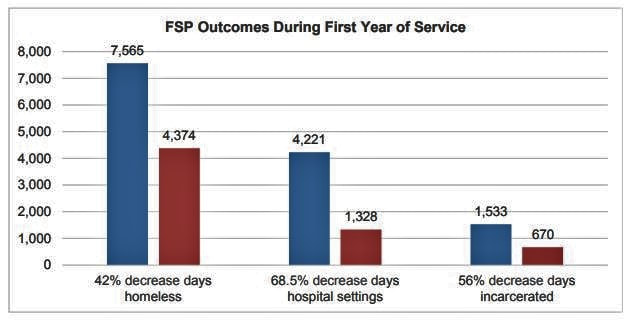Performance Outcome Data - City of Berkeley
Categories on this page include:
|
Children
Criminal Justice Employment |
Hospitalization
Housing |
ChildrenMHSA Annual Update 2019-2020, Pages 187, 189
Early Childhood Trauma Resiliency (ECTR) - Trauma Informed Care Project (MHSA Innovations Project): N - 197 Staff who saw improvements in children's behavior after using trauma informed strategies: increase from 46% to 59%. Criminal JusticeMHSA Annual Update, FY 22/23 (FY 21 Data), Page 23
Of the 71 individuals served who participated in the program for the full year, there was a 56% decrease in days incarcerated. MHSA Annual Update 2019-2020, Page 21. TAY, Adult and Older Adult Full Service Partnership
EmploymentMHSA Annual Update, FY 22/23 (FY 21 Data), Page 28
Transition Age Youth (TAY) Support Services Program Of the 129 individuals who participated in ongoing services during FY21, 39% became employed or entered school (reported through a satisfaction survey). MHSA Annual Update 2020-2021, pp 43, 55, 67
|
HospitalizationMHSA Annual Update, FY 22/23 (FY 21 Data),
Adult and Older Adult Full Service Partnership (FSP), Page 23 Of the 71 individuals served who participated in the program for the full year, there was a 68.5% decrease in days spent in the hospital. Transition Age Youth Support Services Program, Page 28 Of the 129 individuals who participated in ongoing services during FY21, 22% exited the program into stable housing (reported through a satisfaction survey). Homeless Outreach and Treatment Team (HOTT), Page 70
HousingMHSA Annual Update, FY 22/23 (FY 21 Data), Page 23
Adult and Older Adult Full Service Partnership (FSP) Of the 71 individuals served who participated in the program for the full year, there was a 42% decrease in days spent homeless. MHSA Annual Update 2020-2021, Pp 43, 67, 78
MHSA Annual Update 2019-2020. Page 21 and 35
|

